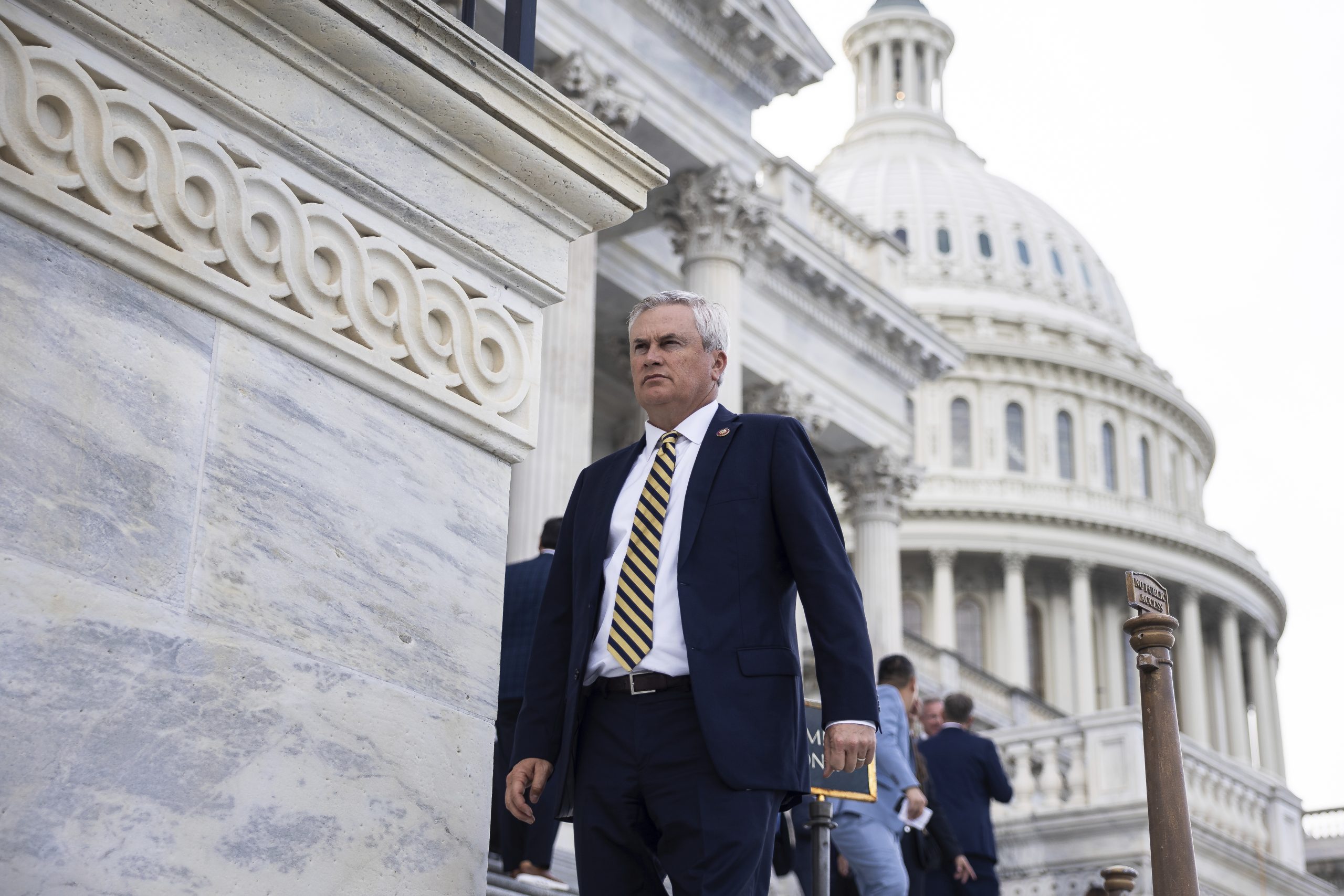House Republicans moved quickly Monday to follow President Donald Trump’s lead as he took unprecedented action to target Washington’s locally elected government — further heightening the GOP’s scrutiny of the capital city and its Democratic elected leaders.
Oversight Chair James Comer (R-Ky.) said he would haul Mayor Muriel Bowser, Council Chair Phil Mendelson and Attorney General Brian Schwalb to Capitol Hill next month for a hearing. The public grilling is likely to come as Trump’s takeover of Washington’s Metropolitan Police Department approaches a 30-day expiration date, requiring congressional action to continue.
“For years, the D.C. Council’s radical, soft-on-crime agenda has emboldened criminals and put public safety at risk in our nation’s capital,” Comer said in a statement.
His voice was one of many in the GOP who hailed Trump’s moves Monday to seize control of the D.C. police force and deploy the National Guard in the capital. Speaker Mike Johnson, for instance, said in a post on X that “House Republicans support this effort to CLEAN UP Washington, END the crime wave, and RESTORE the beauty of the greatest capital in the world.”
While violent crime reached a 30-year low in the city last year, Republicans argue Washington is unsafe and poorly governed. A spate of carjackings and several other recent high-profile incidents have captured GOP attention on Capitol Hill, including the murder of an intern for Rep. Ron Estes (R-Kan.) and the assault last week of a Trump administration staffer.
Comer in his statement said his panel would also be “advancing legislative solutions to protect Americans in their capital city.” During a news conference Monday, Trump called for the reimposition of cash bail, which has been largely abolished in D.C. for more than 30 years, while U.S. Attorney Jeanine Pirro called for congressional action to overturn “absurd” juvenile justice laws that she said provided too much leniency for young offenders.
An Oversight Committee spokesperson said the panel would work to advance legislation introduced by Rep. Byron Donalds (R-Fla.) that would limit “youth offender status” to those 18 years old or younger. Currently, those 24 or younger can qualify as youth offenders in the District.
The legislation from Donalds would also require the D.C. attorney general to publicly track juvenile crime in the city and bar the locally elected D.C. Council from passing provisions to change its sentencing rules.
The bill passed the House last year in a bipartisan 225-181 vote but did not advance in the Senate, which was then controlled by Democrats. The spokesperson said the committee was considering additional legislation but did not provide details. Rep. Elise Stefanik (R-N.Y.), a member of GOP leadership, is also working on legislation to reverse no-cash-bail policies nationwide.
It’s unclear how soon any D.C.-related legislation might hit the House floor. Lawmakers are now on their extended summer recess, and House GOP leaders expect the Oversight Committee to start advancing a slate of bills in September. That means floor action could be delayed until later in the fall, depending on how quickly the panel works through its process, according to three people granted anonymity to discuss internal planning.
House Republicans may be forced to deal with city-related matters sooner, however. Trump’s executive action Monday commandeering the Metropolitan Police started a 30-day clock for presidential control, as provided for in the 52-year-old law establishing the city’s locally elected government.
Extending Trump’s control of the department would require congressional action — forcing the White House and GOP congressional leaders to make a decision as they also deal with messy internal fights over whether to force the release of more documents related to the Jeffrey Epstein case and a politically explosive congressional stock trading ban.
In a letter sent to the Hill Monday informing of the police takeover, Trump said he would retain control “until I have determined, in consultation with the Attorney General, that the emergency has ended or for the maximum period permitted” under federal law.
Trump made no mention of seeking extended control of the department at his news conference Monday morning, where he was flanked by Defense Secretary Pete Hegseth, Attorney General Pam Bondi and other administration officials. He instead called on lawmakers to address the District’s longstanding bail policy, which allows criminal suspects to be released pending trial without putting up any money.
“We’re gonna change no cash bail, we’re gonna change the statute and get rid of some of the other things,” Trump said. “And we’ll count on the Republicans in Congress and Senate to vote, we have the majority, so we’ll vote. We don’t have a big majority, but we’ve gotten everything, including the great Big Beautiful Bill.”
Democrats, meanwhile, sharply objected to Trump’s moves in social media posts Monday, with House Minority Leader Hakeem Jeffries saying Trump has “no basis to take over the local police department” and “zero credibility on the issue of law and order.”
Rep. Jamie Raskin (R-Md.) said he would introduce legislation that would immediately end Trump’s police takeover. He, too, called it a “phony, manufactured crisis” and recalled Trump’s actions dealing with the Jan. 6, 2021, attack on the Capitol — where a mob of his supporters assaulted police and were later pardoned.
While Republicans can likely push D.C.-related bills through the House on party lines, Democrats in the Senate could use the filibuster to keep them from reaching Trump’s desk. Vaulting that obstacle would require a 60-vote majority, and it’s unlikely that Democrats — who have long championed political autonomy for the District’s largely Democratic populace — would join their Republican colleagues en masse. But it could force some vulnerable Senate Democrats into tough votes over crime and safety ahead of midterm elections.
A spokesperson for Senate Minority Leader Chuck Schumer declined to comment on Democrats’ plans for any such legislation, pointing instead to a social media post from Schumer Monday calling the executive actions a “political ploy and attempted distraction from Trump’s other scandals.”
Nicholas Wu and Calen Razor contributed to this report.
